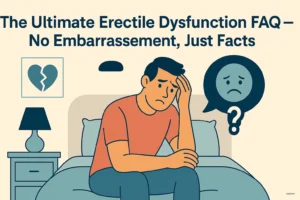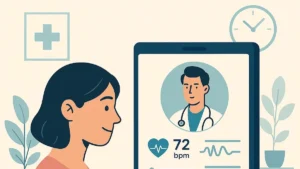
Intimacy is often associated with feelings of joy and connection, but for some individuals, the aftermath of sexual activity can bring unexpected emotions. Post coital depression, also known as postcoital dysphoria or postcoital tristesse, is a phenomenon where people experience feelings of sadness, anxiety, or irritability following sexual intercourse. This condition, while not widely discussed, affects a significant number of individuals and can have a profound impact on their relationships and overall well-being.
Understanding post coital depression is crucial to address the emotional needs of those who experience it. This article delves into the potential causes of these post-sex blues, explores coping strategies for those affected, and discusses when it may be necessary to seek professional help. By shedding light on this often-overlooked aspect of sexual health, we aim to provide support and guidance to individuals who may be struggling with feelings of sadness after sex, as well as their partners who want to offer understanding and compassion.
Understanding Postcoital Dysphoria (PCD)
Definition of PCD
Postcoital dysphoria (PCD), also known as postcoital tristesse or “post-sex blues,” is a condition characterized by unexpected negative emotions following otherwise satisfying sexual experiences 12. Individuals with PCD may experience feelings of sadness, anxiety, irritability, or agitation after consensual sexual activity or masturbation, even if the encounter was pleasurable 23.
Common symptoms
The symptoms of PCD can manifest in various ways, including:
- Tearfulness
- Sadness or depression
- Anxiety
- Irritability or aggression
- Feelings of emptiness or numbness
- Regret, guilt, or shame
- Panic attacks 23
These symptoms typically occur after completed consensual sex and can arise even after physical pleasure and orgasm 2.
Prevalence in men and women
While PCD has been reported more frequently in women, recent studies have shown that it affects both genders. Research indicates that:
- Approximately 46.2% of female students in one study experienced PCD symptoms at least once in their lifetime 4.
- A study of 1,208 male participants found that about 41% had experienced PCD at some point in their lives 42.
- Another study reported prevalence rates of 35.3% for males and 31.2% for females 5.
It’s important to note that PCD episodes are often occasional and usually resolve on their own after a matter of minutes 1. However, when these issues become frequent or severe, professional treatment may be necessary, which can include therapy, medication, or consultation with a medical specialist 1.
Potential Causes of Post-Sex Blues
Hormonal fluctuations
The body experiences significant hormonal changes during and after sexual activity. Orgasms trigger a surge of dopamine, oxytocin, and prolactin in the brain 6. While these hormones typically induce feelings of pleasure and relaxation, some individuals may experience discomfort or sadness if their levels drop too quickly from peak levels 6. This rapid hormonal shift can contribute to postcoital dysphoria (PCD) symptoms.
Past trauma or abuse
A history of sexual trauma or childhood abuse can increase the likelihood of developing PCD 6. Sex is an intimate act, and those who have experienced sexual abuse may associate it with feelings of guilt, shame, or discomfort 6. Even during consensual encounters, individuals with a history of trauma may experience triggering thoughts or emotions, leading to negative feelings after sex 3.
Relationship issues
Unresolved conflicts or tension within a relationship can manifest as post-sex blues. Even if the sexual experience itself is pleasurable, underlying relationship problems can resurface afterward, causing emotional distress 7. Additionally, a lack of support or understanding from a partner can contribute to feelings of shame or guilt associated with sexual activities, potentially triggering PCD symptoms 6.
Psychological factors
Pre-existing mental health conditions, such as depression or anxiety, can influence an individual’s sexual experiences and contribute to PCD 7. These conditions may affect libido or sexual performance, leading to feelings of inadequacy or distress after intimate encounters. Furthermore, negative body image, performance anxiety, or feelings of guilt about sex can exacerbate PCD symptoms 3. Stress from other areas of life, such as work or family difficulties, may also intensify emotional responses after sex, as individuals may feel more vulnerable and open to experiencing their emotions in intimate settings 3.
Coping Strategies for PCD
Open communication with partner
Open dialog with a sexual partner is invaluable for individuals experiencing postcoital dysphoria (PCD). Sharing concerns helps partners understand the situation and provides an opportunity for mutual support. Creating an aftercare practice that works for both partners can be beneficial. This may include verbally checking in after sexual encounters, discussing what felt good, and exploring ways to enhance future experiences 7. It’s important to remember that PCD can affect people of all genders, and open communication can help address any underlying relationship issues that might be contributing to the dysphoria 7.
Self-care techniques
Engaging in self-care activities can help ease the intensity of PCD symptoms. Some effective techniques include:
- Journaling to track experiences and identify patterns
- Taking a warm, mindful shower
- Practicing deep breathing exercises
- Watching a movie or engaging in a fun, distracting activity
- Using essential oils or listening to calming music
Individuals can also try wrapping themselves in a blanket for comfort or getting a massage 83. It’s crucial to fully accept one’s feelings, recognizing that emotions, no matter how painful, are temporary 8.
Grounding exercises
Grounding techniques can be powerful tools to cope with the distressing thoughts and emotions associated with Post-Coital Depression (PCD). These exercises use the five senses or tangible objects to redirect thoughts away from negative feelings and bring focus back to the present moment. The 5-4-3-2-1 technique, which involves counting backward from 5 while focusing on each sense, can be particularly effective. Grounding exercises also provide support for individuals living with PTSD, helping to manage feelings of distress, anxiety, and painful emotions. Understanding the role of DHT and testosterone reduction can be part of a holistic approach to mental health and emotional well-being.
Seeking professional help
When PCD significantly impairs one’s sex life and overall quality of life, seeking professional help is recommended. Individual or couples therapy can offer a safe space for discussion and strategies to cope with PCD 7. A therapist can help address underlying issues such as personal stigma about sex, body image concerns, or insecure attachment styles 8. For cases involving past traumas, finding a therapist who specializes in trauma treatment is essential 8. Additionally, consulting a doctor or sex therapist may be beneficial if PCD is linked to sexual dissatisfaction or health issues 7.
When to Seek Professional Help
While occasional feelings of sadness or unease after sexual activity are common, persistent or severe symptoms may indicate a need for professional assistance. Individuals experiencing postcoital dysphoria (PCD) should seek help when the condition significantly impacts their sex life and overall quality of life. Understanding the role of DHT and testosterone reduction can be part of a comprehensive approach to managing PCD and improving mental health and emotional well-being, particularly in the context of “Post-Coital Depression”.
Frequency and severity of symptoms
If PCD symptoms occur frequently or intensify over time, it may be necessary to consult a healthcare professional. In some cases, individuals may notice a worsening of symptoms as sexual activity increases, leading to greater discomfort and emotional distress 4. When these issues become recurrent or severe, professional treatments such as therapy, medication, or consultation with a medical specialist may be indicated 1.
Impact on relationships
PCD can have a significant effect on relationship dynamics. When symptoms lead to deterioration in the relationship with a partner, causing subjective discomfort for both individuals, it’s advisable to seek professional help 4. Open communication with a therapist or counselor can help address underlying issues and improve overall relationship satisfaction.
Underlying mental health conditions
While PCD can occur independently, it’s essential to consider potential underlying mental health conditions. If an individual experiences persistent symptoms of anxiety, depression, or other mental health disorders alongside PCD, professional help may be necessary 10. A mental health professional can assess for co-occurring conditions and provide appropriate treatment, which may include therapy, medication, or a combination of approaches 11.
Conclusion
Post coital depression is a complex issue that has an impact on many individuals, regardless of gender. Understanding its potential causes, from hormonal fluctuations to past trauma and relationship issues, can help those affected to better manage their symptoms. Coping strategies like open communication, self-care techniques, and grounding exercises can be valuable tools to deal with post-sex blues.
When PCD symptoms become frequent or severe, it’s crucial to seek professional help from your primary care doctor. This can involve therapy, medical consultation, or specialized treatment to address underlying mental health conditions. By shedding light on this often-overlooked aspect of sexual health, we hope to encourage more open discussions and support for those experiencing post coital depression, ultimately leading to healthier relationships and improved overall well-being.
FAQs
What are some effective strategies for managing post-coital dysphoria?
To manage post-coital dysphoria, it’s important to acknowledge and accept your feelings. Practicing self-compassion can be very beneficial. When you experience these feelings, try to recognize and understand your emotions, allowing them to pass naturally without trying to suppress them.
How long can post-coital dysphoria typically last?
Post-coital dysphoria (PCD) can vary in duration, lasting anywhere from 5 minutes to 2 hours. This condition can occur regardless of whether an orgasm was achieved and has been observed after consensual sex, general sexual activity, and masturbation.
What are the common symptoms of post-coital blues?
Post-coital dysphoria, also known as post-coital tristesse, includes feelings of anxiety, depression, or irritability following sexual intercourse or masturbation. In some instances, it can lead to a panic attack. It’s a condition experienced by many individuals at some point in their lives.








